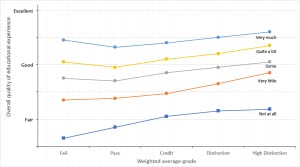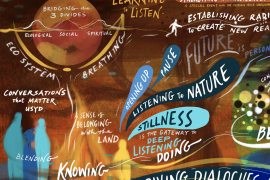
Students’ sense of belonging is closely associated with their ratings on the overall quality of their educational experience at the University (figure to the right). As might be expected, grades matter: educational success is generally associated with higher overall satisfaction. The strong relationship between the overall experience and the sense of belonging is, however, striking. In the analysis, the effects of grades and belonging are close to being independent of one another. Peer interaction and the quality of the transition experience and teaching appear to be the most important factors for students reporting a greater sense of belonging.
What is a ‘sense of belonging’?
Students with a high sense of belonging feel accepted. They fit in. They feel connection to their peers, teachers and studies. Our students are extremely diverse: some come from overseas, some commute, some come from schools with already established groups of friends, some are returning to study and some are the first in their families to attend university. Students who have no sense of belonging do not engage as well with the curriculum, even if it is well designed (Kift and Nelson, 2005). Connectedness grows in a successful transition process through a welcoming and supporting environment and social engagement but most strongly through learning, particularly as part of a like-minded community of learners.
In his highly influential article from 1975, Tinto identified 4 factors which are barriers to belonging: (i) the nature of the academic work and workload, (ii) educational success, (iii) anxiety and (iv) self efficacy. Meehan and Howells (2018) explored these factors through a series of interviews with first year students in the UK. Students identified a large change in expectations around study, and the workload associated with it, compared to high school and not understanding what they needed to do. Thomas (2012) and O’Keefe (2013) both reported that students are less likely to leave if they have positive relationships with their peers and educators, particularly with tutors. Burke et al. (2016) also highlighted the key role that academic staff play and, in particular, how they can help or break the fragile sense of self and capability that many students have as they begin university. All of these studies, and others, point to the importance of pedagogical approaches which promote student engagement through experiential and social learning experiences and authentic assessments with early feedback. All students, but particularly those first in-family and those from non-traditional or minority backgrounds, may need study and career advice, opportunities to build confidence and deliberate support around anxiety.
the most powerful transition experiences happen inside units of study
Developing a sense of belonging in units of study
The experience of students during transition is one of the most important factors in developing a sense of belonging. Transition is not an event, involving some students in some units or including some groups in orientation activities. It needs to be a continual process during the first vital weeks of the first semester. The activities that help students transition successfully to study, and build a sense of belonging, blur the traditional distinction between the more formal academic and the more social and informal. To ensure that every student has the opportunity to transition to become a successful, self-directed and resilient learner, inclusive learning environments that actively engage students in their studies and with their teachers and peers need to be deliberately built into every course. Whilst inclusive and effective student services, supports and social activities are important, the most powerful transition experiences happen inside units of study.
Peer-peer and student-teacher interactions
Classroom activities that are social and involve peer-to-peer interaction are beneficial for both learning and for developing a sense of belonging. In lectures, tutorials and online discussion forums, opportunities to discuss ideas and build concepts together helps students understand complex topics and learn about the diversity of ideas available amongst their peers. Collaborative learning approaches can lead to topics as potentially dry as academic integrity become rich, engaging and vibrant conversations. There are many tools and approaches to building social and inclusive classrooms, as explored in a number of our Modular Professional Learning Framework modules. First year units often have high enrolments. Although this can often be a challenge, it also means that any social in-class or online activities have the benefit of a diverse and large cohort. Alongside helping students feel part of a positive learning community, collaborative learning approaches can help enhance students’ mental health and wellbeing.
Collaborative and active learning strategies allow students to interact positively with both their peers and with their teachers. Feeling that their teachers care and can be approached is critical for students to feel part of the new institution that they have just joined. Relationship-rich experiences with their lecturers and tutors help students feel both valued and connected to the University and the disciplines in which they choose to focus. For large units in particular, the role of the tutor comes to the fore. To ensure that students, lecturers and tutors get a chance to get to know each other, opportunities for social learning can be combined with simple tricks such as icebreakers and name tents to make sure everyone knows everyone’s name and how they prefer to be addressed.
Feeling that their teachers care and can be approached is critical for students to feel part of the new institution that they have just joined.
To assist student to feel a sense of belonging, teachers can also make students feel welcome through the ways they communicate. This might start with an introductory video welcoming students to their unit and sending personalised messages to students at the start and at key points in the first few weeks of semester. The language and terminology we use, although familiar to us, may be confusing to students who don’t have family or friends who have attended university. A simple “frequently asked questions” (FAQ) page on Canvas or links to pages such as the glossary on the Current Students website can help reduce confusion and assist students (as well as reduce workload for teachers and support staff).
Values affirmation and framing interventions
The large size and diverse nature of our first year cohort can be challenging for all of our students but it is particularly so for those without the family or friendship networks with the knowledge to support them. Students who perceive or have a background which is quite different to those around them can suffer from ‘imposter syndrome‘ and doubt that this is a place where they are likely to succeed. Values affirmation exercises involve students identifying the values that are important to them and their reasons for studying. Studies show that for many students, but in particular those from non-traditional backgrounds, this simple writing task can have both immediate and long lasting benefits to their sense of belonging and likelihood of succeeding.
Framing interventions help students deal with academic challenges – such as those experienced when they encounter feedback on their first assignment. They help students realise that such challenges are common, improvable and part of the learning process. Whilst this is important for all students, it can be particularly significant for students who have not experienced this before. Alongside engaging students with feedback as a tool to improving, framing interventions could include using statistics, quotes and even letters from senior students on their experiences.
Professional purpose
Our students are studying at university at a time of considerable economic, social and environmental turmoil. For those in professional degrees, there may presently be an obvious route to a career but many of these are subject to disruption and may even disappear. For those in liberal studies and more generalist degrees, there may not be an obvious career routes. The students may have chosen their degrees for many reasons – perhaps by curiosity, by parental pressure or by simply following what they were good at during school. My own route into Chemistry was certainly the latter. I had no idea what kind of jobs those with a Chemistry degree might do and no role models except for my high school chemistry teachers.
Given the financial cost of studying and the uncertain future of employment, it is not surprising that students worry about their job prospects, their choice of degree and the balance between their studies, part-time work and social lives.
Developing a professional purpose early in a degree helps students start to think about their life after university, and hence their choices whilst at university, but without a narrow career focus. By considering their choices and a professional future which is aligned to their personal values, aspirations and outlook, students can develop goals which are challenging and which are likely to lead to more satisfying careers.
Transition units of study
Given the importance of developing a sense of belonging as part of the transition, the Student Experience Strategy recommends that “every undergraduate and postgraduate student encounters dedicated and context-appropriate support academic and social transition to the University” through the introduction of ‘transition units’. These would include use of appropriate interactive and collaborative learning designs and a supplementary social program to foster diverse peer interactions. In some degrees, such as those where core units taken by all students already run, these elements will be built into these existing units. In others, especially those where students have considerable freedom to choose, they will need to be built into a number of units or into new dedicated units.
The details of the academic and social transition program are currently being designed for the units to run in 2021 and to be trialled in existing units nominated by the faculties and schools in 2020.






14 Comments